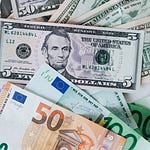In this episode marking the start of the new earnings season, we discuss how banks and the Fed are responding to the recent baking crisis, the state of the consumer, and Buffett's take on AI.
The episode is based on yesterday's newsletter which is available on Substack.
A transcript of this podcast, with relevant images and quotes, is available for all subscribers after the show notes below. Our podcast is available on Apple Podcasts, Spotify, Google Podcasts, YouTube, and Amazon Music.
Show Notes
00:00:00 Introduction
00:00:07 Banking Stress Calms Down
00:01:56 How Will the Fed React?
00:05:23 Is The Banking Crisis Over?
00:07:03 The Car Market
00:08:40 Buffett and AI
00:10:57 Conclusion
Transcript
Introduction
[00:00:00] Scott: Welcome everyone to a new episode of The Transcript podcast. You've got me, Scott Krisiloff, I'm editor of The Transcript, along with Erick Mokaya who's our lead author.
Banking Stress Calms Down
We sent out a new issue of the newsletter two days. It was the start of the earnings season last week. So some of the banks started to report. JP Morgan reported. Wells Fargo reported, Citigroup reported and a couple of regionals. And of course, the thing that we were watching most closely for was what was going on with respect to deposits, with the financial stress that had happened in March, and how much was that impacting banks? And I think my big takeaway is that things have calmed down a lot. I think that you saw a deposit inflow to some of the big banks. That wasn't surprising. You did see outflows happening, but general outflows in deposits across the banking industry. But the stress that happened in March at least, has subsided for the moment. Erick, any thoughts about any of this?
[00:00:54] Mokaya: I agree with you. The key takeaway is of course that the banking crisis is a bit behind us. So I think there was a bit of impact of course for the small banks. There's a bit of deposit flows from the small banks to the big banks. So the big banks, although they had deposit outflows throughout the quarter, they decelerated towards the end as more inflows came in from the small banks. So most of the banks are a bit cautious in saying that they got inflows, especially the big ones. They're a bit cautious in saying that they took deposits from small banks. But generally the key takeaway is that all is well. Nothing is happening, especially in the banking circles that is out of the norm. So I think the outflows were as expected and everything is back to normal. Mostly driven by what the Fed did during March. So I think that's the key takeaway. But one key takeaway maybe. And that's something that a lot of people are paying attention to is CRE exposure. Any takeaway from the banks that reported in terms of how that's going? And also the cost of funds has gone up a bit for some of the banks. So I think CRE is one area that everyone is paying attention to. Any takeaway?
How Will the Fed React?
[00:01:56] Scott: Yeah, I think before we go much deeper into what banks were saying, I think we should circle up actually on the implications for the macro side and Fed policy which are that as the banking press subsides, the Fed is more likely to go back to a hawkish stance. And so we saw some of that. Christopher Waller was talking last week and was extremely hawkish in the way that he was speaking about the economy, feeling like we still haven't made enough progress on inflation or labor markets.
“Monetary policy needs to be tightened further. I would welcome signs of moderating demand, but until they appear and I see inflation moving meaningfully and persistently down toward our 2% target, I believe there is still more work to do...Whether you measure inflation, using CPI or the Fed's preferred measure of personal consumption expenditures or PCE. It is still much too high and so my job is not done." - Federal Reserve Christopher J. Waller
And even though we're starting to see some of those pressures subside in earnings calls and seeing people starting to talk about more slowness in the economy and slowing and hiring, the Fed still seems to be gearing up for more interest rate increases going on this year. And so you have that dynamic. And then in addition, going back to the banking side, you have banks that have increase in cost and funds. I think everybody is looking at their deposits and seeing that interest rates on a headline basis are 4.75 to 5% and only receiving sub-1% on their deposits. And people are really starting to ship deposits into other areas. And so Schwab actually reported this week, not last week, but one of the things I noticed is that they saw, I think it was a 30% year over year decline in deposits, but then they saw a hundred billion inflow to their money market funds. So there's a lot of money moving into short-term money market funds, short-term credit, those sorts of things.
"And so we saw a lot of people move their portfolios out of the smaller banks that were, that had yields that were much lower into the larger banks as we saw today in some of the earnings and into the money market funds, we've seen over 500 billion of money leaving the banking system into the capital markets, and that's one of the pervasive things I talked about today...We expect to shift from deposits to money market funds to be a longer-term trend and are actively working with clients to help them diversify and enhance the yields they're earning on their cash." - BlackRock (BLK 0.00%↑) CEO Larry Fink
[00:03:28] Mokaya: A key question for you perhaps, the inflation is now at 5% I think from last week's numbers and reading. The Fed funds rate is slightly above that. Isn't that a signal that they're about to stop soon? Or is this just a different market and they are hell-bent on putting that inflation back down from 5% to almost 2%?
[00:03:48] Scott: I don't think that it's above the 5% inflation rate and then core inflation was higher than headline inflation now. And so the Fed still probably is gonna bring above 5%, maybe not materially much more, but at least hold it there is what they're still talking about as well while inflation remains above 5%. So to use your words, I think they are hellbent on getting inflation back to 2%. Or if there's a recession coming, maybe that changes the calculus sum. But until they get back to their 2% level, I think that they're still biased toward tightening credit conditions, which I think you're really starting to see a slowdown this quarter. You really are. Genuine slowdown in the economy. They could tumble into recession pretty easily, over the next three, six months.
[00:04:35] Mokaya: Then maybe an additional point was from FOMC minutes that actually, they start themselves as seeing is it a mild recession in the second half of the year. So I think it ties back to what you're saying that maybe the Fed is actually given the subsiding risks of banking crisis and that banks are now stable, they're a bit more prepared for higher rates and the fact that's not maybe trickling down to any parts of the economy as they had hoped after the March raise. So I think going into May, it looks like another raise is in the works. And this has to go on until the inflation actually comes down to 2%, or at least we feel like a recession is coming through. So I think that's why I think JP Morgan and Bank of America both have, as their base case, a mild recession in the second half of this year.
Is The Banking Crisis Over?
"We're not through with bank failures. But we're through the depositor, depositors haven't had a crisis. The owners of banks may have lost a hell of a lotta money. The people who bought the debt of the holding company may they may lose a lotta money. People can lose a lotta money. But the depositors aren't gonna so you don't need to turn a dumb decision by managers into a panicking the whole citizenry of the United States about something they don't need to be panicked about." - Berkshire Hathaway (BRK.A) CEO Warren Buffett
And if you look at a few of the other things that we picked up in the newsletter it seems like several parts of the economy are actually slowing down as they respond to the rate hikes that have happened so far. So I think that's a key takeaway to keep an eye on. But also something else that Warren Buffett also said that there could be more bank failures. What did you make of that statement that there could be more?
[00:05:45] Scott: I don't know. It was an interesting one because both Jamie Dimon and Warren Buffett had kind of signaled that the banking crisis isn't over, but at the same time signaled that it was over.
So it was a little bit surprising, but Warren Buffet in saying that, I think was mostly just talking about...He said that the deposit outflow should be done because he would bet that nobody's gonna lose money as a depositor in a bank. I think he was talking about really on the asset side of balance sheets banks have gotten overextended in certain areas really with respect to duration, I think. This commercial real estate thing is coming into play. More and more recently, but to me that feels more like people grasping to fight, like to justify what just happened on the banking side with something new. That's not to say that it can't spiral into something. Certainly, people could start to get concerned about commercial real estate. Certainly, delinquencies could go up, but it feels, at least to me, more like when people were talking about all day after subprime, like there was a whole period after the financial crisis in 2008, 2009, where you would see these charts of all of the all day mortgages that are coming due and all the refinancings. And those big bad things frequently don't materialize. And so I guess I would be more surprised than not if this one did on commercial real estate.
The Car Market
"Our diversified business model delivered total sales of $5.7 billion, down 26%, compared to last year, driven by lower retail and wholesale volume and prices. In our retail business, total unit sales declined 12.6% and used unit comps were down 14.1%. Average selling prices declined approximately $2,700 per unit or 9% year-over-year." - CarMax (KMX 0.00%↑) CEO William Nash
[00:07:03] Mokaya: I think that one takeaway is that this is one of the most anticipated recessions ever. It's like we've been waiting for this for almost half a year or so, and of course, there's a couple of signals that we also picked up in the newsletter. And I think one which you also emphasized a lot was CarMax. What were your key takeaways from their kind of assessment of what the economy is doing apart from some of the negative trends they're seeing in the auto market?
[00:07:25] Scott: Yeah, I think it's the commentary on the consumer that CarMax is seeing that stuck with me on that earnings call which first of all, their numbers are down like their sales are down 26%. So like big declines in comps, which you're not seeing in other parts of retail. Like those are big numbers, bigger numbers than we're seeing in other places. But then also talking about dynamics like consumers coming into the showroom thinking they want to buy, but then getting sticker shock, basically, once they see what the monthly payment is going to be with interest rates and wherever car prices are right now, and deciding, eh, maybe it's not a good time to buy a car. So that to me is again, indicative of real deterioration in consumer balance sheets and real deterioration in consumer psychology that would be easy to transfer to the rest of the economy. Just happens to be in larger ticket items right now.
[00:08:17] Mokaya: That's a bit concerning, given that for a long while during the pandemic, consumers really really wanted to buy cars. And what was happening during the pandemic is that there was more demand than supply. And now the demand seems to be pulling back and now looks like some auto companies may actually be stuck with a bit of more inventory if consumers are actually getting that sticker shock or looking at some of the items and wondering whether they're going to be able to pay.
Buffett and AI
"I don't really understand it. I think it's an incredible technological advance in terms of showing what we can do. But I don't know whether we know what happens. And I was listening who was it the other day that knows a lot about technology? He just says that it scares him. Well, if it scares him, it scares me in terms of the possibilities of I mean, we've done amazing things, like we figured out how to create an atomic bomb back in 1945. I didn't know what an atom was or anything, but then Einstein told me it was gonna change the world, and it changed the world. So I don't wanna change the world too many times without knowing or having some idea of the consequences of it. And this, I think this is extraordinary, but I don't know whether it's beneficial." - Berkshire Hathaway (BRK.A) CEO Warren Buffett
So beyond the consumer, maybe one more thing before we close; AI and Buffet. Buffet thinks AI cannot be able to make jokes for him. So that was an interesting perspective from him. This is an incredible piece of technology, but he is not convinced or doesn't know yet whether AI is good or bad so to speak. And of course, also an interesting perspective of him investing a lot in Japan now is very geared towards, he's invested in the top five companies. I think in the last three years he's raised from 0% to 7.4% owning some of the companies there. Any takeaways from Buffet on AI and also on investing in Japan?
[00:09:22] Scott: No, I think I love Warren Buffet as much as the next guy, but he's got his shtick and he sticks to it. So technology, he's never gonna understand. And the US is always gonna keep growing and life is always better than it was. And I don't disagree with any of that, but it's striking to me the extent to which, how much economic value you could extract from planning ignorance of technology when technology's been such a huge growth driver of the economy for the last 35 years, 40 years, 50 years. It seems like a massive miss to me, but I'm not sitting with Buffet's billions. So what do I know?
[00:10:00] Mokaya: One thing before you go, something to do with the Meta. I'm surprised that Meta has completely shifted now to focusing on AI and of course, they seem to have recognized that maybe AI is bigger than the metaverse. Is that a good takeaway from that?
[00:10:12] Scott: That what? AI is bigger than the metaverse? I actually think they come together, honestly, like there's generative AI. If you want to create an immersive media experience with AI, that happens in the Metaverse, right? Or it can happen in the metaverse. It can really uplevel the metaverse, so to speak. So I don't think that the two are totally unrelated, which means that the Metaverse to me is still like an undervalued thing probably, but I'm recognizing that I'm very wrong right now along with Zuck.
[00:10:47] Mokaya: But since I mean the company's doing well so far, I think at least in the stock market since it hit some lows last year. Seems like people are aligning with this vision going forward.
Conclusion
That being said, I think it's another big week in earnings. Thanks for helping us reach episode hundred on The Transcript. Looking forward to another week of earnings. So I'll see you again next week for more content from us.














Share this post